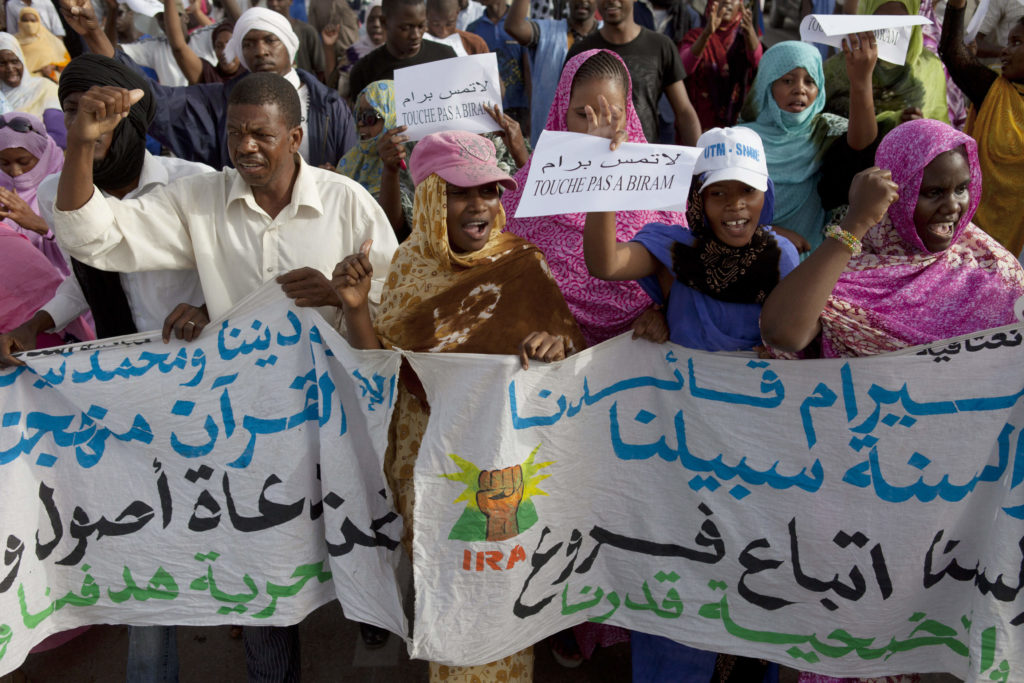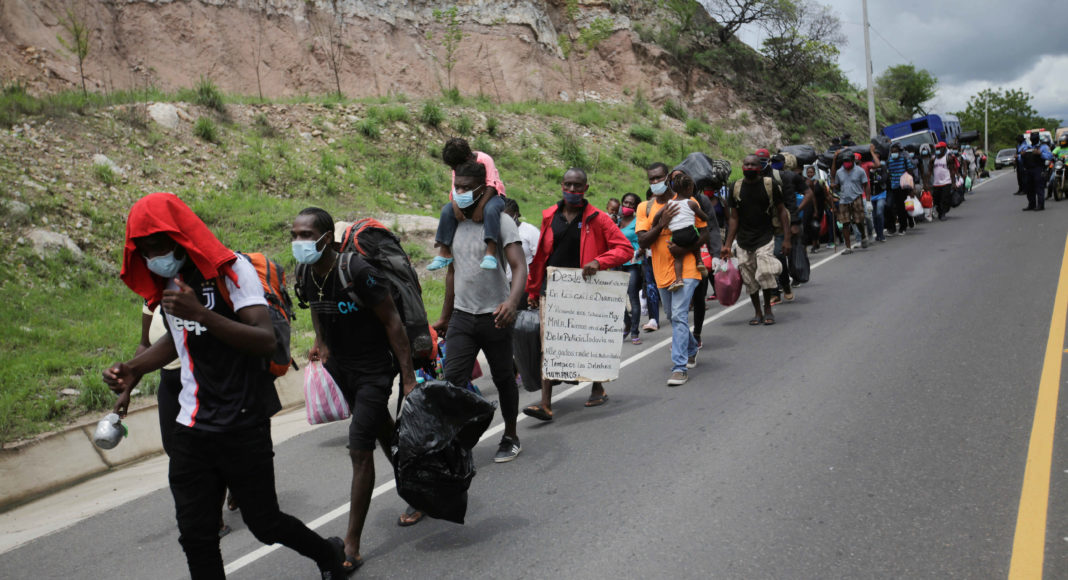By Joe Penney
When 26-year-old Cameroonian asylum seeker Wilfred Tebah was reunited with his family in Columbus, Ohio, in early February, one of the first things he was looking forward to was the taste of ekwang, a rich cocoyam dish from southwest Cameroon made with crayfish and palm oil.
But after a year and a half in ICE detention centers in California, Arizona, Mississippi and Louisiana, Tebah found it overwhelming and couldn’t finish his plate. His taste buds had been deformed by the food served to detainees: rice, cheese, and a dark gravy that he and his fellow Cameroonians called “engine oil” because of its look and flavor.
ICE released Tebah on a provisional basis while he appeals his asylum denial in the Fifth Circuit federal immigration court. Without protections known as Temporary Protected Status (TPS) or Deferred Enforced Departure (DED), he could be deported back to Cameroon, putting his life in imminent danger. And without TPS, he will likely be excluded from the 11 million undocumented people that President Joe Biden says will benefit from a pathway to citizenship in his proposed immigration bill. Unless Biden enhances protections for Black immigrants in his proposed bill, he will be leaving them in the cold.
Tebah is one of some 10,000 Cameroonians who have sought asylum or otherwise immigrated to the US since 2016, according to Sylvie Bello, CEO of the Cameroon American Council. He and his fellow Cameroonians are fleeing a brutal civil war between a repressive Francophone government led by 88-year-old Paul Biya, a dictator in charge for the past 39 years, and Anglophone separatist groups.
While in detention in Pine Prairie, Louisiana, he led some 40 other African detainees in a hunger strike against racist treatment from immigration judges and detention officials. The hunger strike put him in the hospital with dangerously low blood sugar levels. Over the course of his stressful 18 months in detention, he developed high blood pressure and angina, a heart disease that causes severe chest pain. But his greatest fear is being sent back to Cameroon, where he and his family would be put at great personal risk.

Immigration advocates and policy experts say it is not safe to send Cameroonians back to an active conflict zone. “The fratricidal war currently taking place in Anglophone Cameroon and the indiscriminate arrest, detention and torture in that part of the country underscore the legitimate fears of asylum seekers from Cameroon about their safety, should they be deported from the United States back to their homes in the conflict zones,” said Dr. Christopher Fomunyoh, senior associate for Africa at the National Democratic Institute for International Affairs.
The secretary of the Department of Homeland Security can classify a country for TPS if there is an “ongoing armed conflict (such as civil war), an environmental disaster (such as earthquake or hurricane), or an epidemic, or other extraordinary and temporary conditions” that “temporarily prevent the country’s nationals from returning safely, or in certain circumstances, where the country is unable to handle the return of its nationals adequately.” Currently, Somalia, Sudan and South Sudan are the only African countries on the TPS list. Liberia qualifies for DED, a classification made by the President.
By these definitions, a number of African countries should qualify for TPS. Besides Cameroon, immigrants from Mauritania need protection because the country still practices slavery against Black people. A civil war between the Ethiopian government and armed groups in the Tigray region has displaced at least 2.2 million people since November 2020, according to the UN, while conflict in eastern Democratic Republic of Congo kills thousands every year.
Dictatorships in Uganda, Eritrea, and Equatorial Guinea mean that asylum seekers from those countries face imprisonment and threats to their lives if deported. Conflict in Central African Republic threatens to destabilize the central Africa region. Jihadist insurgencies fuel widespread killings and massive displacement in Mali and Burkina Faso. “Conflict and human rights abuses by both armed groups and government forces are recurrent in these two countries, and the impact on civilian life has increased yearly since 2017,” explained Ousmane Diallo, Francophone West Africa researcher at Amnesty International.
Black immigration advocates want more countries added to the TPS list. “If you’re going to give immigration relief protections to diasporans based on having a dictator in their country, Cameroon and Uganda should be on everyone’s shortlist,” Sylvie Bello of the Cameroon American Council said. As one of his last policy initiatives in office, former President Trump granted DED status to Venezuela. The fact that Venezuela was added but not Cameroon “is white supremacist immigration policy in action,” Bello said.
Mauritania is also a top priority for TPS for Black immigration advocates. The country was the last nation in the world to abolish slavery in 1981, and only criminalized the practice in 2007 under international pressure. Slavery against Black people in Mauritania still exists, and the mainly Arab government often tries to exclude Black people, who are the majority in the country, from citizenship.
Former President Trump’s administration deported many more Mauritanians than previous administrations, and Biden’s administration has continued Trump’s policies. If Mauritanians “are deported, in many cases, they face jail time and human rights abuse. Often when they are deported, the government doesn’t even recognize them as Mauritanians, so in some cases there is an issue of statelessness,” said Houleye Thiam, president of the Mauritanian Network for Human Rights.
“Mauritania is one of the few countries in the world that still have slavery. I’m not saying every black Mauritanian that’s returned is going to be a slave, but the simple fact that there is still slavery is a valid reason to extend TPS to Mauritanians,” she added.

Guerline Jozef, founder and executive director of Haitian Bridge Alliance, said that TPS should also apply to more Caribbean countries that have dealt with natural disasters, in addition to African nations. “Cameroon, Mauritania, and the Bahamas are majority Black countries that are struggling with different issues and need TPS. Bahamas is still recovering from the effects of Hurricane Dorian. Haiti’s TPS is running out soon and re-designation is crucial and needed, especially right now with the ongoing conflict in the country. We are on borrowed time to cover and protect the Haitian community,” she said.
On February 17th, 14 senators and 28 representatives wrote to President Biden and DHS Secretary Alejandro Mayorkas asking for TPS or DED for Cameroonian immigrants. The letter was an initiative of Senator Chris Van Hollen and Representative Anthony G. Brown of Maryland, a state home to a large Cameroonian-American community.
A spokesperson for Senator Van Hollen said that Secretary Mayorkas has not yet responded to the letter, and that Senator Van Hollen “hopes the Biden Administration will do a thorough review of these cases and other countries that may qualify for TPS/DED designation, in coordination with the State Department and following the guidance and recommendations of experts on the ground – which were too often ignored by the Trump Administration.”
Former President Trump attacked TPS, which affects 10 countries and more than 300,000 people, throughout his time in office. President Biden’s new bill offers most TPS holders a pathway to citizenship, which is why the push to expand TPS is so urgent.
However, some immigration advocates are concerned about loopholes related to the bill, including a definition of aggravated felony that exists in current law that would disproportionately exclude Black immigrants. “My fear is that if those parts of the law are not ripped out, then we are going to see the loopholes continue to grow and to snatch up Black people, just like what we saw with his deportation moratorium,” said Patrice Lawrence, co-director of the immigrant rights organization UndocuBlack.
Biden issued a memorandum halting most deportations in his first 100 days in office, but ICE has carried out 26,248 deportations since he was sworn in, including expulsions of babies and pregnant mothers from Haiti. Some in his government have blamed this broken promise on a Texas court decision that peeled back Biden’s deportation pause, but immigration advocates were quick to point out that deportation decisions are made at the discretion of DHS Secretary Mayorkas.
Biden has not made any efforts to repeal a Trump-issued order that abused the Title 42 public health law to deport asylum seekers without due process, saying they are a health risk due to the Covid-19 pandemic. The Trump administration deported more than 400,000 people using Title 42, and the Biden administration has continued that policy, deporting thousands more.

The Southern Poverty Law Center issued a statement asserting that “the invocation of Title 42 was a thinly-veiled bigoted and xenophobic action that has achieved its goal of cutting off access to asylum for thousands, cloaked in the pretense of protecting public health,” and that “the continued use of this policy is indefensible.” On February 23rd, 61 members of congress wrote a letter to Secretary Mayorkas demanding an end to Title 42 expulsions.
Some advocates argue that even with expanded TPS, Biden’s proposed immigration bill does not get to the heart of why people need to immigrate the US in the first place. Liberians come to the US in part because the US colonized Liberia, for example. The US has blocked Haitian development in numerous ways since the country declared independence in 1804. The Cameroonian civil war is a colonial legacy that puts regions of the country that were colonized by France against those that were colonized by the UK. The US and France can play important roles in ending the war via their permanent seats on the UN Security Council, but thus far have chosen not to do so.
“We need a comprehensive immigration bill that goes to the root causes of gaps in immigration in the first place. It’s because of forced involuntary migration such as slavery, anti-Black racism and imperialism,” Sylvie Bello said, arguing that reparations must also be part of any truly far-reaching immigration reform.
While he awaits his asylum appeal and the threat of deportation clouds the future, Wilfred Tebah is praying for TPS for Cameroon and savoring every moment of freedom after his prolonged and life-threatening detention. “I thank God that at least now I can do what I want. I can go outside when I want, I can sleep when I want, I can eat what I want to eat, when I want,” he said. He is slowly recovering his taste for Cameroonian food.


